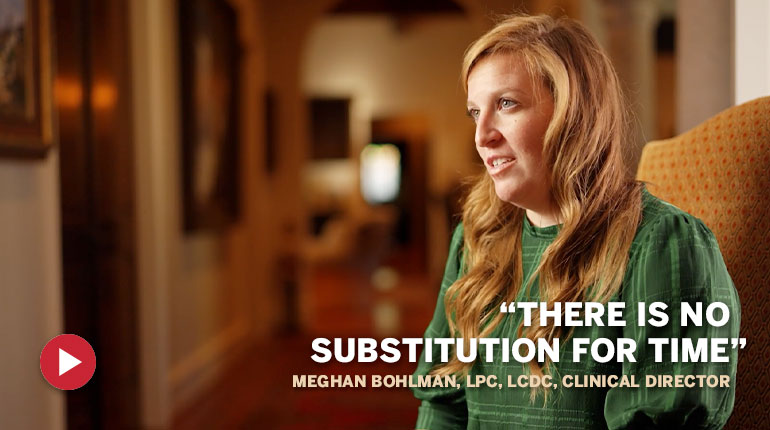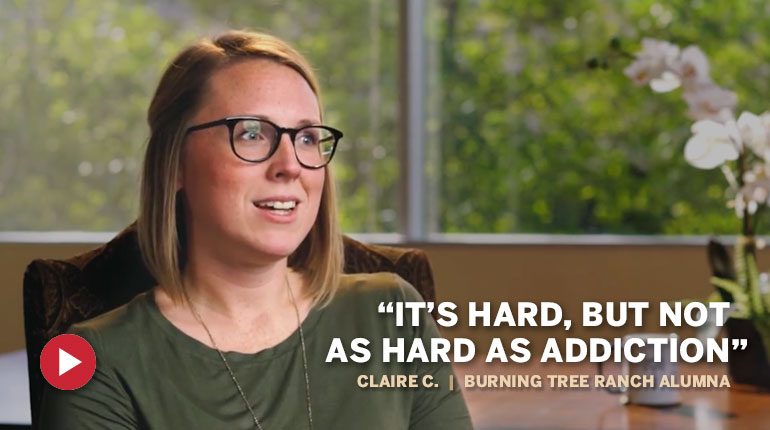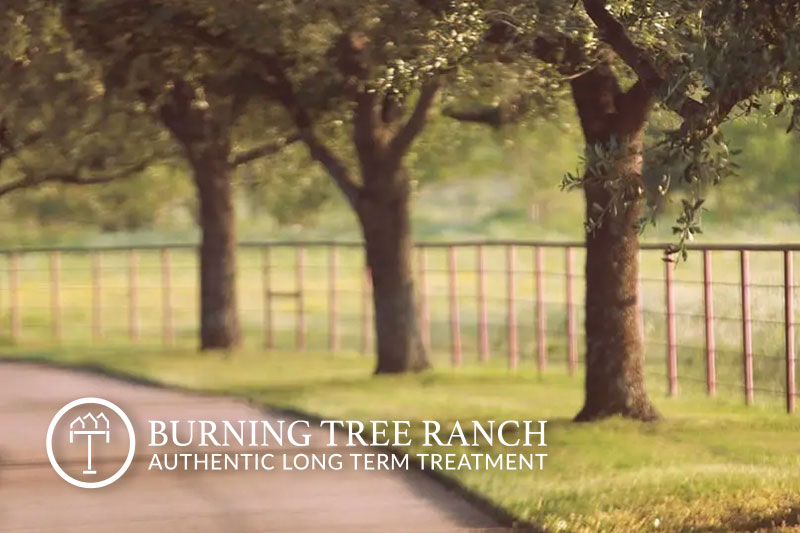What We Treat: Chronic Relapse & Co-Occurring Mental Health Disorders
Dedicated to Treating Difficult, Advanced Stages of Addiction
Burning Tree specializes in helping individuals who have experienced chronic relapse and have struggled to maintain sobriety despite multiple treatment attempts.
Our program is long-term, progress-based, and highly intensive. It’s uniquely designed to address the challenges faced by those with advanced stages of addiction, providing the comprehensive care and support needed for lasting recovery.

“Time gives us the ability to treat all of the mental health components that are active, for all of the addicts and alcoholics that we treat.”
Meghan Bohlman, LPC, LCDC, Clinical Director

Dual Diagnosis: Addressing Substance Abuse and Mental Health Together
Dual diagnosis, or the presence of a mental health disorder alongside a substance use disorder, is a common occurrence among individuals struggling with addiction.
The Substance Abuse and Mental Health Services Administration estimates that 45 percent of individuals who suffer from addiction share a co-occurring mental health disorder.
While this is an estimate, we believe it to be accurate.
The effects of post-acute withdrawal symptoms can persist for several months, which makes it difficult for short-term treatment providers to distinguish the difference of legitimate underlying mental health disorders.
We believe that determining accurate, measurable baselines are pertinent to the effective, whole-health treatment of the chronic relapser.
45%
of persons who suffer from addiction also suffer from a mental health disorder.
Our program addresses the underlying mental health conditions that keep the addicted person trapped in the cycle of relapse.
Mental Health Disorders Common in Dual Diagnosis
- Personality Disorders Learn more about personality disorders & the relationship with substance abuse.
- Anxiety Disorders Generalized anxiety disorder & phobias are highly prevalent in dual diagnosis.
- Feeding & Eating Disorders Eating disorders like binge eating bulimia may coincide with substance abuse issues.
- Sleep-Wake Disorders Sleep disorders like insomnia may contribute to self-medicating with substances.
- Trauma & Stressor-Related Disorders PTSD & acute stress disorders frequently co-occur with addiction.
- Obsessive-Compulsive & Related Disorders Learn more about OCD & related disorders co-occuring with substance use.
- Neurodevelopmental Disorders Learn about how ADHD & similar disorders can increase the risk for substance abuse.
- Bipolar & Related Disorders Bipolar disorders include manic episodes where substance abuse is more common.
- Depressive Disorders Alcohol & substances are commonly used to self-medicate for depressive symptoms.
Chronic Relapse: Advanced, Life-Threatening Addiction
Chronic relapse refers to a pattern of repeated attempts at sobriety followed by a return to substance use, often despite the negative consequences and a genuine desire to quit.
This cycle can be devastating for individuals and their families, leading to frustration, hopelessness, and even life-threatening consequences from continued use.
The clients who participate in our long-term treatment program are often in dire straits by the time we receive them. Out of necessity, we’ve come to specialize in the treatment of difficult, advanced stages of addiction that have not been mended in other, shorter-term treatment episodes.
We’re just grateful they’ve come to Burning Tree before the consequences of addiction take a more severe toll on their health and well-being.

The Burning Tree Client
- Continues substance use despite increasingly grave consequences
- Struggles with undiagnosed, misdiagnosed, or untreated co-occurring disorders
- Fails to maintain therapeutic, medication, and self-care routines
- Faces difficulties in managing anxiety, depression, and stress
- Delays seeking help, minimizing the gravity of their addiction
Burning Tree Families often describe these behaviors as perplexing and, at times, deeply frustrating. Yet, the overriding sentiment revolves around the pain they cause.
Substance Use Disorders
At Burning Tree Ranch, we provide comprehensive treatment for a wide range of substance use disorders, including:
- Alcohol
- Prescription Drugs
- Benzodiazepines (Valium, Xanax)
- Amphetamines (Adderal, Vyvanse)
- Opiates (Hydrocodone, Percocet)
- Stimulants
- Cocaine
- Methamphetamines
- Opioids
- Fentanyl
- Heroin
- Inhalants, Nitrous
Our team of experienced professionals understands the unique challenges associated with each substance and tailors treatment plans to address the specific needs of each individual.
Progress-Based Metrics: Measuring Success and Ensuring Accountability
Burning Tree utilizes milestone-based metrics to track, analyze, and examine the progress of our clients during every phase of treatment. With this approach, we disregard the number of days, weeks, or months that have passed in treatment.
After all, our clients did not get sick over the course of a few months. It took years. Most families, by the time they reach us, have already come to terms with the fact that easy, short-term fixes are no longer worth pursuing.

“I believe Burning Tree arms our clients with all the skills they might need, whether it be life skills, immersion in the 12 steps, trauma work, or work with a psychiatrist. We arm them with the tools they need to achieve a life of excellence beyond sobriety.”
Meghan Bohlman, LPC, LCDC, Clinical Director
Our Mission: Lasting Recovery and a Life of Excellence
Our mission is to help individuals achieve permanent recovery and build a life of excellence beyond sobriety.
The entirety of our Ranch Team is trained, licensed, and experienced with helping others find and maintain sobriety. We use a multi-disciplined approach to treating the whole person by integrating addiction medicine, evidence-based treatment, and trauma-informed programming.

Authentic Long-Term Treatment for Chronic Relapse
Burning Tree Ranch is a highly sophisticated long-term residential treatment and aftercare program designed exclusively for the chronic relapser.
Operating outside the limitations of a traditional 30, 60 or 90-day format, Burning Tree adheres to progress-based metrics that inform the clinical treatment team of the unique mental, emotional, and spiritual needs of each client, resulting in dynamic breakthroughs for those formerly unable to achieve meaningful, long-term recovery.
As of today, we are the only treatment center in the United States that combines time-intensive residential treatment with a therapeutically coordinated aftercare program focused singularly on the treatment of chronic relapsers.

How Do I Know If My Loved One is a Fit for Burning Tree Ranch?
Featured In Top Publications








